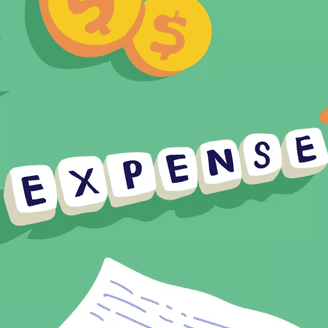- Osome Blog SG
- How Entrepreneurs in Singapore can Pay Less Tax Legally
How Entrepreneurs in Singapore can Pay Less Tax Legally
- Modified: 26 August 2024
- 6 min read
- Money Talk


Osome Content Team
VIP Contributor
Osome has been collaborating with 21 authors from 4 countries. We embrace diversity and are proud that lawyers and founders, journalists and financial analysts choose to work with us.
Congratulations if you’re a first time taxpayer on your company’s income. Time to do all the calculations on how much tax you’ll have to pay.
Did you know that you can reduce your company’s taxable income and pay less tax to IRAS by writing off some of your business expenses? But which expenses can a company deduct from its income?
The short answer is "the deductible ones". Those you cannot deduct from your income are referred to as non-deductible (disallowable) expenses.
If you’ve never known this before and need extra help in the form of a Singapore accounting services provider, read on.
What Is Taxable Income?
In Singapore, taxable income of your business is:
- profits from selling your products or services
- income from investments (for example, dividends or interest)'
- royalties, premiums and any other profits from your property
Example
Amy owns the bookstore chain “Read Road”. In 2019, she earned S$300,000 selling books and stationery. Amy also invested in Singapore Exchange and made S$1,000 in dividends. Plus, she got S$5,000 from her franchisee.
In total, Amy’s taxable income for 2019 is S$306,000. The corporate income tax rate is 17%. Amy owes S$52,020 in taxes.
What Is a Deductible Expense?
While doing business, you not only do earn money, you also spend it. You pay salaries and insurance for the employees, buy the stationery and pay the office rent.
You have the right to deduct some of these spendings from the income you file to IRAS to pay taxes on.
First, here is how IRAS defines the nature of a deductible expense:
- Running this expense must help your business generate profit. For example, your advertising costs are deductible, while the petrol for your private car is not.
- You have a (legal) liability to pay it. For example, your insurance contributions payments are something you are contractually obliged to pay, so they are deductible. But if you plan to buy a set of pens for the office, but have not done it yet, you cannot write these spendings off.
- You do not spend it on fixed assets. The purchase of a new production site is not deductible while getting packs of paper for the office is.
What Is Deductible and What Is Not?
This table outlines business spheres where you can make deductions. But there are limits — follow the links inside for the details.
Example
Let’s get back to Amy, with her taxable income for 2019 equalling S$306,000 and the tax to be paid — S$52,020.
In 2019, Amy spent:
- S$200,000 on salaries
- S$50,000 on advertising campaigns
- S$100 on renewing her business licence
- S$7,000 on renting the business office
All of these can be deducted. Amy’s taxable income becomes S$48,900 and the tax she must pay — S$8,313 against the initial S$52,020.
Deductible Costs
Deductible costs embrace a whole range of your business activity spheres: from the salaries you pay to the employees to the money you spend on advertising. We cover what is possible for you to write off from your taxable income, do the counting and provide examples and tips.
Human Resources costs
Human resources costs are the money that your company spends on its employees:
- Salaries;
- Remunerations for directors;
- Bonuses;
- Staff training;
- Employees’ income tax borne by the company;
- Retirement scheme payments, etc.
Following the government rules, such payments can be deducted only if they are enforced contractually.
Medical and insurance costs
Medical expenses. These spendings are deductible if they are capped at 1% of the total remuneration your employee gets in a year.
Example
Amy paid her accountant Jack a total of S$100,000 in 2019: this includes Jack’s salary, a bonus for fulfilling an extra project, and compensations of several months’ accommodation as well as medical expenses. The medical spendings make S$2,500 of the whole sum.
However, Amy can deduct only what makes 1% of this sum: S$100,000 x 0.01 = S$1,000. This is not taxed. Another S$1,500 goes to Amy’s taxable income.
If your company is under Portable Medical Benefits Scheme (PMBS), your cap is 2% — check out the detailed conditions.
- CPF contributions. These are compulsory payments you make for your employees on retirement, healthcare, and housing needs. You pay them to the Central Provident Fund. However, the contributions above the annual CPF limit (now standing at S$37,740) cannot be deducted. For 2020, the limit is S$37,740 per company.
- Employees’ Insurance. You can deduct insurance premiums — the monthly/quarterly/annual payments to the insurance company. However, there are exceptions, depending on who is the beneficiary of the payments in your insurance plan.
The beneficiary | Deductible |
|---|---|
| An employee or their relatives | ✔ |
| You, an employer | ✔ |
| Your business | if you meet the conditions |
Travelling and business costs
You can deduct the costs that you or your employee incur while you go on business trips. A single taxi ride counts as a business trip, and so does travelling to another country.
The travelling and business costs include:
- Plane and train tickets;
- Accommodation;
- Company’s car maintenance;
- Public transport;
- Taxis, etc.
Finance and professional costs
These include your company’s costs on covering your legal obligations — for example, tax reporting, or your financial obligations with a bank. Here is a list:
- Accounting fees;
- Higher purchase interest (when you keep paying the interest for the asset you already have);
- Interest on the money you borrow for your business;
- Legal fees you face when you hire lawyers to recover your debts or renew the leases, etc.
Running costs
Running costs are something related to the day-to-day activities of your business:
- The money you spend on advertising;
- The fee you get for renewing your business licence;
- The rent of the office space;
- Utility or telephone charges;
- Stationery and postage fees;
- The purchase of goods for resale, etc.
The list goes on.
Non-deductible Costs
Your business’ fixed assets make a big part of what you cannot deduct from your taxable income. Non-deductible expenses are also anything that you spend on what is not directly connected to generating profit. For example, you cannot deduct your company’s registration fees or your private car costs.
Capital costs
These include:
- Spendings on buying new fixed assets (such as plants, machinery, etc.).
- Depreciation of fixed assets. However, you can still claim capital allowances on them, which are also deductions, but under another name and conditions.
- Start-up fees (licence and company registration costs).
- Legal fees and stamp duty on a new lease agreement.
- Fees to enter Singaporean professional bodies (such as Singapore Medical Association or Institute of Certified Public Accountants of Singapore).
- Renovation costs. However, if they do not change the structure of the premises, some of them can be deducted, for example, changing the paint on the walls or improving general lighting.
Private costs
These costs are not connected to your business activity and thus are non-deductible. Here is what they include:
- Your commuting-to-work costs.
- Your private car costs (even if you use it for business purposes). Note that maintenance, repairs, parking, and fuel costs of corporate vans, lorries and buses are deductible.
- The money you spend on food, household or entertainment of you and your family. However, entertainment to the benefit of the company is deductible provided that existing or potential customers are invited.
- Travelling expenses for personal trips.
Deducting Rules: Prove Your Spendings
You cannot just write off everything without a substantial reason and paper proof. You have to keep bills, records and other reasoning for any spendings for 5 years in case IRAS wants to see it.
IRAS also has a set of special requirements for some expenses. We cannot list all of them here, so please refer to your Singapore accounting company for details.
For you to have an idea about how demanding IRAS can be, here’s a list of documents to provide when you want to deduct the costs of hiring a business consultant:
- Provide name, Number of National Registration Identity Card (NRIC) and address of the person you pay (if the person is non-resident, confirm you paid the withholding tax);
- State the amount you pay to the person;
- Cover the nature of the service you get;
- State the place(s) where the service was provided;Report if the person is in any way connected to the directors or shareholders of the company.
Key Takeaways
- Anything you can deduct reduces the amount of the corporate income tax you pay to IRAS.
- A deductible expense is what is clearly and fully related to your business and helps it generate profit.
- Many deduction rules have exceptions and limits — make sure you benefit from them all.
- Five years, yes 5. This is the time frame you must keep documents proving your spendings are deductible.
There are other ways to reduce the taxes you pay: learn business-specific tax incentive scheme.






